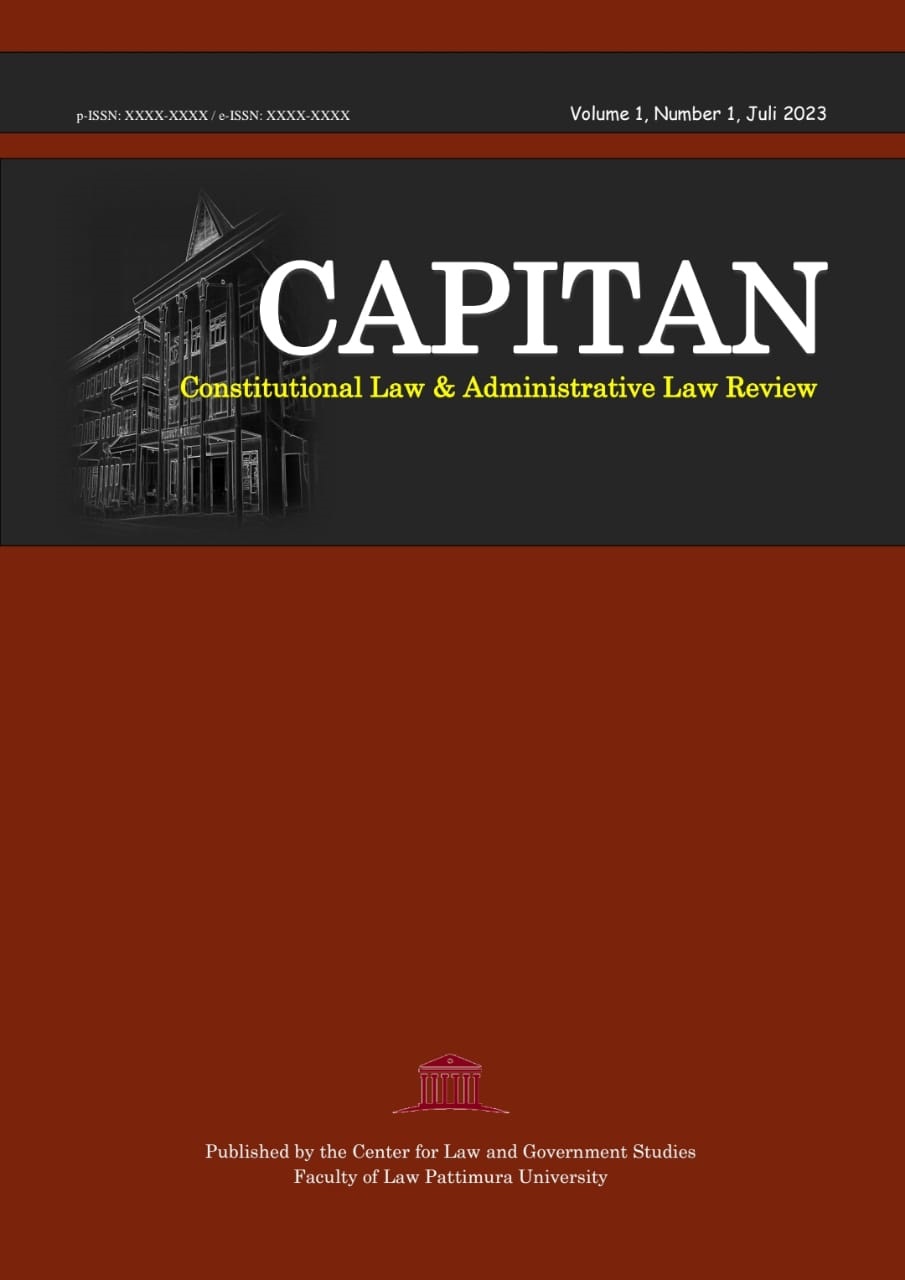Penempatan Rumah Dinas Polisi Republik Indonesia Oleh Purnawirawan Polisi
Abstract
The placement of a POLRI official residence by a retired officer is something that is not permitted according to the law, this is because the POLRI official residence itself is intended for active police officers. To find out what form of supervision there is over the placement of official residences by retired police officers and what legal consequences arise because of this, this research was conducted with the aim of safeguarding the rights of active police officers regarding placement in official residences. The research method used in this research is normative juridical with a statutory approach, a conceptual approach, a legal history approach and a comparative approach. The legal materials used are primary, secondary and tertiary legal materials which are analyzed qualitatively. The results of the research show that the form of supervision over the placement of POLRI official residences by retired police officers is repressive supervision in the form of disciplinary sanctions such as written warnings, official warnings, and withholding of rights and facilities. The legal consequences that arise for retired police officers who still occupy official residences include legal action in the form of official warnings and even legal action.
Downloads
References
Bisri Ilham, Sistem Hukum Indonesia, Jakarta: Grafindo Persada, 1998.
Fakhri Muhammad, “Kewenangan Propam Dalam Menegakkan Fungsi Pengawasan,” Jurnal Hukum & Pembangunan, Vol. 2, no. 4, (2009).
https://www.satuhukum.com/2019/11/akibat-hukum.html?m=1,29.
Jazim Hamidi, Revolusi Hukum Indonesia: Makna, Kedudukan, dan Implikasi Hukum Naskah Proklamasi 17 Agustus 1945 dalam Sistem Ketatanegaraan RI, Konstitusi, Yogyakarta: Press & Citra Media, 2006.
Peter Mahmud Marzuki, Penelitian Hukum, Jakarta: Kencana, 2011.
Philipus M Hadjon, Lembaga Tertinggi dan Lembaga –Lembaga Tinggi Negara Menurut Undang–Undang Dasar 1945 Suatu Analisa Hukum dan Kenegaraan, Surabaya: PT. Bina Mulia, 1992.
Ristra Lemdikasari, “Tinjauan Yuridis Mengenai Pemindahan Hak Menempati Rumah Dinas Di Kepolisian,” Jurnal Mahasiswa Hukum, Vol.3, no.7, (2013).
Saartje Sarah Alfons, “Calon Independen Dalam Pemilihan Umum Kepala Daerah”, Jurnal Konstitusi, (2010), p 02. https://fhukum.unpatti.ac.id.
Setiadi Wicipto, “Sanksi Administrasi Sebagai Salah Satu Instrumen Penegakan Hukum Dalam Peraturan Perundang-Undangan,” Jurnal Legislasi Indonesia, Vol. 6, no.4, (2009).
Soebroto Brotodiredjo dalam D.P.M. Sitompul dan Edward Syahperenong, Hukum Kepolisian di Indonesia (Suatu Bunga Rampai), Bandung: Tarsito, 1985.
Suparno, Pengelolaan Barang Milik Negara, Jakarta: Ghalia Indonesia, 2011.
Yoyok Ucuk Suyono, Kedudukan POLRI Dalam Sistem Ketatanegaraan Di Indonesia Setelah Perubahan UUD Tahun 1945, Yogyakarta: Laksbang Grafika, Cet.2, 2013.
Yuli Wiratna, “Pengawasan Terhadap Pelanggaran-Pelanggaran Hukum dan Penanggulangannya Di Tengah Masyarakat,” Jurnal Ilmiah Ilmu Hukum, Vol. 6, no.7, (2011).
Zudan Arif Fakrulloh, Hukum Indonesia Dalam Berbagai Perspektif, Jakarta: PT RajaGrafindo Persada, 2014.
Copyright (c) 2024 Assor Januarta Marwan (Author)

This work is licensed under a Creative Commons Attribution-NonCommercial 4.0 International License.
Authors who publish their manuscripts in this Journal agree to the following conditions:
- The copyright in each article belongs to the author, as well as the right to patent.
- Authors are able to enter into separate, additional contractual arrangements for the non-exclusive distribution of the journal's published version of the work (e.g., post it to an institutional repository or publish it in a book), with an acknowledgment of its initial publication in this journal.
- Authors are permitted and encouraged to post their work online (e.g., in institutional repositories or on their website) prior to and during the submission process, as it can lead to productive exchanges, as well as earlier and greater citation of published work.
- Authors have the right to self-archiving of the article (Author Self-Archiving Policy)













